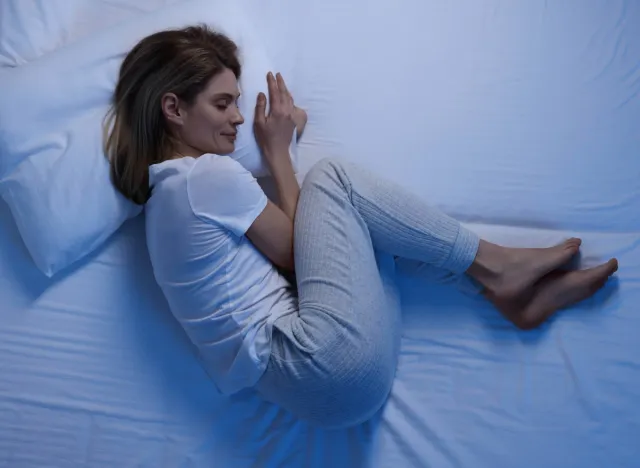Let’s be honest: Everyone has their favorite go-to position when they turn in for the night. Do you prefer the fetal or side sleep position? Did you know that there’s also a “starfish,” “log,” and “soldier” position? It’s important to note that some sleep positions are better than others for promoting a quality night’s sleep. We consulted with a neuroscientist and wellness expert who reveals the best sleep positions for quality rest and why each one is beneficial.
Did you know that the most important reason for a good night’s rest is for body recovery and healing? According to research, sleeping well aids in your muscular, skeletal, and immune system recovery. How you sleep can majorly affect your behavior, mood, and overall quality of life. In addition, how long you sleep is directly correlated to serious health issues, including stroke, cardiovascular disease, obesity, and more.
That being said, learning how to improve your sleep routine is essential. Knowing the best sleep positions for quality rest is an excellent place to start. So before you turn in for the night, check these out.
1. On Your Back


“Widely recognized as a supportive sleep posture, this position helps maintain the spine’s natural alignment and reduces pressure on joints,” explains Dorsey Standish, MS, a neuroscientist, wellness expert, mechanical engineer, and CEO of Mastermind Meditate. In fact, research shows that sleeping on your back with your arms by your sides can help you avoid shoulder and neck pain.
Keep in mind that back sleeping might not be the optimal choice if you have breathing issues. Standish points out that lying flat on your back can create a narrowed or blocked airway, leading to snoring or sleep apnea.
2. Side Sleeping


Sleeping on your side is a healthy choice, especially because it helps with digestion and can reduce snoring.
“Sleeping on the left side is often recommended for better heart health and reduced acid reflux,” explains Standish. “Using a supportive pillow under the head and neck as well as between the knees can help keep the spine aligned.”
Research reveals that subjective quality of sleep is highest for individuals who sleep on their right side rather than sleepers who prefer their left side.
3. Fetal Position


An all-time favorite is the fetal position because it’s quite comfortable. It closely resembles a side sleep position, but your body is also curled inward, like a fetus.
“Sleeping in the fetal position can alleviate lower back pain and encourage relaxation by providing an extra sensation of support and cradling,” Standish shares.
Frequently Asked Questions (FAQs)
What are the best sleep positions for quality rest?
1. Is there a recommended sleep position for optimal rest?
The best sleep position for quality rest can vary from person to person. However, many experts recommend sleeping on your back with proper head and neck support to align the spine.
2. How does sleeping on your back help with quality rest?
Sleeping on your back can help distribute weight evenly and maintain proper alignment of the spine, reducing the likelihood of discomfort and pain. It can also help prevent issues like acid reflux and wrinkles.
3. Are there any specific sleep positions to avoid for quality rest?
Sleep positions that strain the neck or back, such as sleeping on the stomach, are generally not recommended for quality rest. It can lead to aches, pains, and poor sleep quality.
4. What if I find it uncomfortable to sleep on my back?
If sleeping on your back is uncomfortable, you can try sleeping on your side with a pillow between your knees to help align your spine. This position can also improve breathing and reduce snoring.






